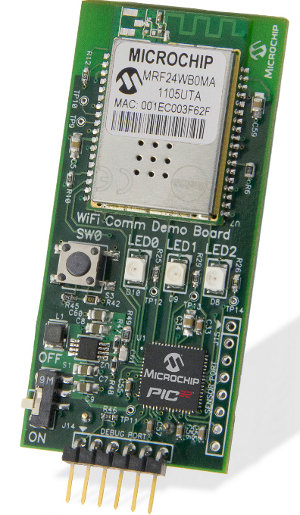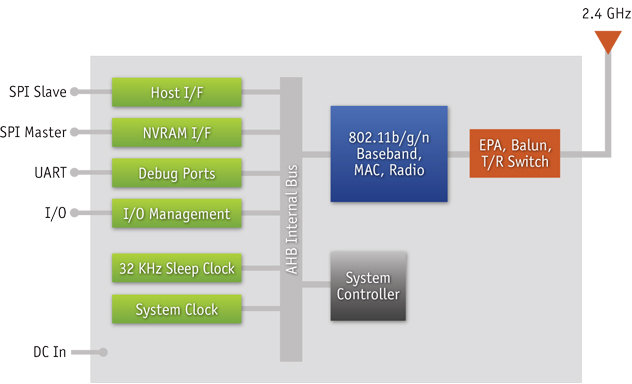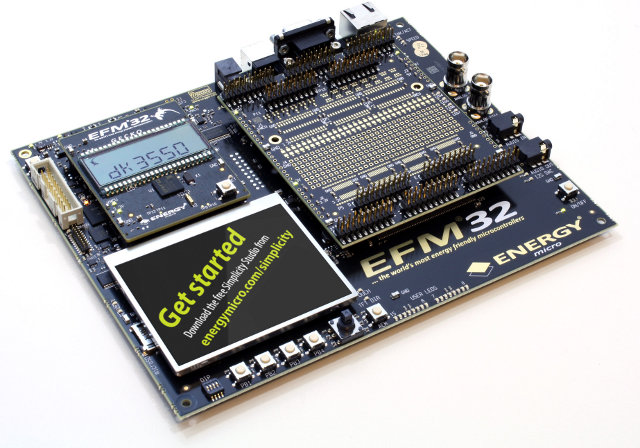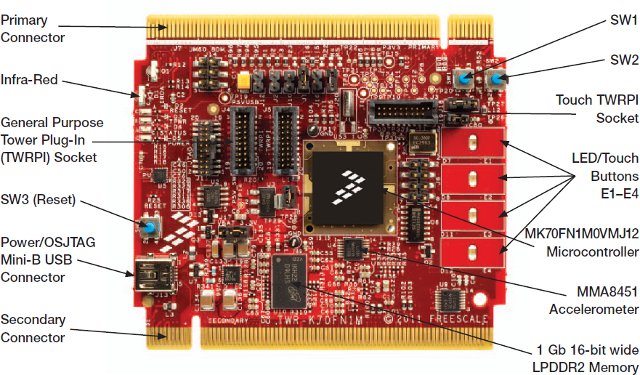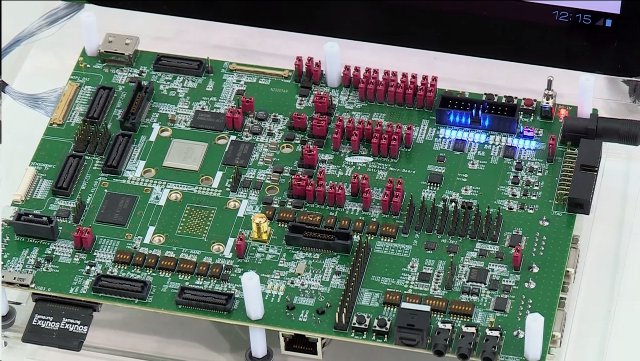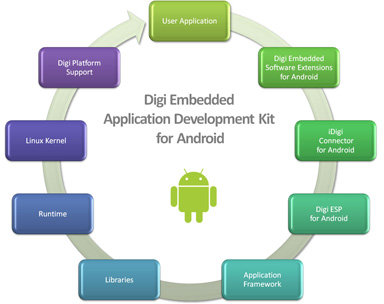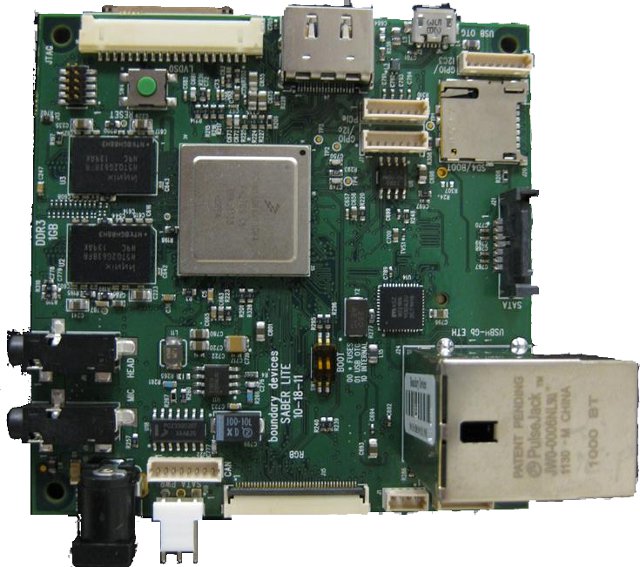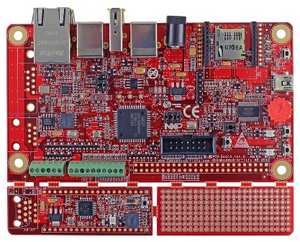After TI and Qualcomm, here’s another WiFi solution for MCU aimed at the internet of things (IoT). Yesterday, Microchip Technology announced the Wi-Fi Comm Demo Board, which combines a Microchip 32-bit PIC32 microcontroller (PIC32MX695F512H) with a low-power MRF24WB0MA embedded Wi-Fi radio transceiver module. This small (and cheap) demo board can be used to integrate with existing embedded designs and/or to evaluate Wi-Fi connectivity with a 32-bit MCU. Contrary to TI and Qualcomm, the IP network stack is not implemented in hardware, but Microchip provides a TCP/IP stack that can be freely downloaded at http://www.microchip.com/get/A3VP. This TCP/IP stack includes HTML, DHCP, DNS, IPv4/v6, SSL, etc… (See diagram below) The memory footprint is 28-34 KB depending on the modules used. I could not find details about power consumption, but the company claims their solution can also run with just 2 AAA batteries. Microchip explains that this solution can enable the rapid growth […]
Qualcomm Atheros AR4100P Provides WiFi Connectivity to the Internet of Things
In January, Texas Instruments was the first company (to my knowledge) to release a WiFi chip for the internet of things, the SimpleLink Wi-Fi CC3000, where WiFi is mostly implemented in hardware to lower power consumption. Now, the company has some competition with the announcement of Qualcomm Atheros AR4100P, an improved version of its AP4100 WiFi chipset, including IPv4/IPv6 support. The AR4100 targets the home, enterprise, smart grid and home automation and control applications that have lower data rates and transmit or receive data on an infrequent basis. The AR4100 system-in-package (SIP) features the following: Low energy Power saving modes as low as 5 µA Wake-up times as low as 2.2 ms Support for Quad SPI flash for faster wake times Low system resource requirements Low footprint host driver (25K Flash and 8K RAM) Simple, low-cost wireless system integration LGA package simplifies 2- or 4-layer PCB design Near zero RBOM […]
Energy Micro Announces EFM32G-DK3550 Gecko (Cortex-M3) Development Kit
Energy Micro has just announced the availability of the EFM32G-DK3550 development kit based on ARM Cortex-M3 EFM32G890F128 MCU. The kit (pictured below) is based on the main board from the bigger Leopard and Giant Gecko kits and supports SEGGER J-Trace and J-Link in order to reduce the need for additional debugging tools. Here are the development kit specifications: EFM32G890F128 Gecko Cortex-M3 MCU 4MB PSRAM 16MB NOR-Flash 320 x 240 RGB resistive touch TFT display Ethernet MAC/PHY microSD slot audio I/O and I2S DAC USB debug interface, SEGGER J-Link debugger Advanced Energy Monitoring (AEM) system to monitor the prototype’s energy consumption. 2x RS232, IrDA Switches, Joystick, LEDs, potentiometer… EXP32 Prototyping area (right side of the picture) For software development, Energy Micro provides Simplicity Studio suite, which includes energyAware Profiler that can interface with the AEM system via USB, gather all relevant system data, and display real-time graphs of current consumption on a […]
uClinux Running on Freescale Kinetis K70 MCU (Cortex-M4) Module
Last year, I posted about Linux for Cortex M3 & M4 Micro-controllers and noted it was difficult to find cost effective Cortex-M based boards able to run uClinux or Linux (RAM being the main issue). Freescale TWR-K70F120M is a module based on Kinetis K70 MCU (Cortex M-4) with plenty of RAM (128MB) to run Linux or uClinux. It is available for 109 USD or 179 USD with Freescale Tower system (TWR-K70F120M-KIT). Here are the key features of the module: Freescale MK70FN1M0VMJ12 Cortex-M4 MCU @ 120 MHz (Product Brief) Touch Tower Plug-in Socket General purpose Tower Plug-in (TWRPI) socket On-board JTAG debug circuit (OSJTAG) with virtual serial port 128 MB DDR2 SDRAM memory 256 MB SLC NAND flash memory Three axis accelerometer (MMA8451Q) Potentiometer Micro-SD Card slot I could not find an open source uClinux implementation for Kinetis K70, but emCraft has a Linux Board Support Package (BSP) for the Freescale TWR-K70F120M-KIT […]
Samsung Exynos 5250 Dual-core Cortex A15 and GAIA SMDK Development Board
Samsung showcased its new Exynos 5250 Dual-core Cortex A15 processor at Mobile World Congress as well as the corresponding Samsung Exynos 5 GAIA SMDK Development board. Announced in November 2011, the new Samsung Exynos 5250 processor features 2 Cortex A15 clocked at 1.7 GHz or 2 GHz, with a Mali-T604 GPU and support for dual-channel 800 MHz LPDDR3 RAM that allows for a data bandwidth of up to 12.8 GB/s. The processor is manufactured using 32-nm HKMG (High-K Metal Gate) technology that reduces leakage by 30% proving lower power consumption. Samsung claims the new Exynos 5 processors are twice as fast and consume twice as less power than its previous Exynos 4 application processor based on Cortex A9. This seems to confirm TI OMAP 5 vs. Nvidia Tegra 3 benchmark results. The Exynos 5250 supports embedded DisplayPort (eDP) interface up to WQXGA resolution (2560×1600), which is handy for Samsung since […]
Digi International Unveils Embedded Application Development Kit for Android
Digi International has released its Application Development Kit for Android (the world first Android embedded application devkit according to the company) at Embedded World 2012. This Development Kit is comprised of both software and hardware components. The software development kit (SDK) includes drivers and Digi software extensions to create Android-based applications on embedded platforms while eliminating tedious driver development work. The kit also includes one of 2 Digi Wireless modules based Freescale i.MX51 (ConnectCore Wi-i.MX51) and i.MX53 (ConnectCore for Wi-i.MX53). The complete Digi Android development kit includes: Quick start guide Digi Application Development Kit for Android CD/DVD Documentation and development board schematics ConnectCore Wi-i.MX53 module – 1 GHz Freescale i.MX53, 512 MB NAND Flash, 512 MB DDR2, -20 to +70° C. 7″ WVGA LCD panel with touchscreen Digi JumpStart Kit development board: 3 serial ports (1 x RS-232/422/485, 1 x RS-232 Tx/Rx, 1 x TTL) VGA and HDMI 1.3 video outputs […]
Boundary Devices Unveils Nitrogen6X Freescale i.MX6 Development Kit (aka i.MX6q Sabre Lite)
Arrow Electronics and Boundary Devices have launched the Nitrogen6X, a low cost development kit based on Freescale i.MX6 quad-core cortex A9 processor. Here are the technical specifications of the Nitrogen6X board: Quad-Core ARM Cortex A9 processor at 1GHz (i.mx6Quad) 1 GB of 64-bit wide DDR3 @ 532MHz Board Dimensions: 4.5″ x 3″ 2MB Serial Flash Three display ports (PRGB, LVDS, HDMI) Parallel camera port with OV5642 Interface Multi-stream-capable HD video engine delivering 1080p60 decode, 1080p30 encode and 3-D video playback in HD Superior 3-D graphics performance with quad shaders for up to 200 Mt/s Separate 2-D and/or Vertex acceleration engines for an optimal user interface experience Serial ATA (SATA) Dual SDHC card slots PCI express port Analog (headphone/mic) Audio 10/100/1G Ethernet with Power over Ethernet support 2 RS-232 Serial ports 10-pin JTAG interface I2C/GPIO/SPI 3 High speed USB ports (2xHost, 1xOTG) CAN port TiWi 802.11 b/g/n WiFi+BT optional Supports Android […]
Embedded Artists and NXP Release The First ARM Cortex-M Android Open Accessory Development Kit
Embedded Artists and NXP introduced the TN-20764, a board that can be used with Android Open Accessory Application (AOAA) development kit that features 2 NXP Cortex-M MCUs, at Embedded World 2012. The board includes Ethernet, CAN and IEEE 802.15.4 interfaces as well as a remote CAN node, enabling designers to develop accessories for consumer applications, as well as home, building and industrial automation applications requiring different types of connectivity. There are already Arduino and PIC-based Android Open Accessories, but this board is the first AOAA kit based on ARM Cortex-M micro-controllers. As mentioned above, the board features 2 Cortex M micro-controllers: The NXP LPC1769, a 120-MHz Cortex-M3 based MCU, provides the interface to the Android mobile device via its full-speed USB transceiver . The LPC1769 also includes 512 KB flash and 64 KB on-chip SRAM, an Ethernet MAC, a CAN 2.0B controller, an 8-channel, a 12-bit ADC, a 10-bit DAC, […]


